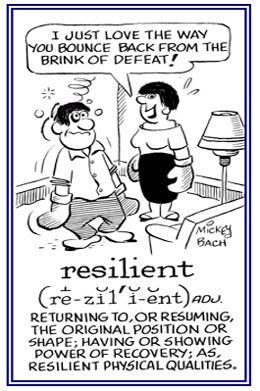sali-, salt-, -sili-, sult-, -salta-
(Latin: to leap, leaping; to jump, jumping; to hop, hopping; to spring forward, springing forward)
Don't confuse this sali-, salt-; "jump" unit with another sal-, sali- unit which refers to "salt".
Mary and the other the students exulted when the last day of school finally arrived.
The country was exulting and celebrating when the war ended.
The football team and their fans exulted at their winning of the final championship game.
2. Lively or triumphant joy, as over some success or victory: There were many great exultations in several places when it was reported that the killer had finally been captured.
2. A rude action intended to offend or to hurt someone: The pay, that the employer offered to the employees for the extra work that they did, was an insult.
3. A remark or action that suggests a low opinion of someone or something: The news article is an insult to the intelligence of the readers.

Larry, this is Fattie; I mean, Hattie!
This picture illustrates an insult by someone who has said the wrong thing about another person.
2. To affect as an affront; to offend or to demean: The book deliberately insulted the religious beliefs of the group.
3. Something that is so useless or contemptible as to be offensive: The new wage offers and retirement changes by the company were insulting the workers who had spent so many years producing quality products that resulted in great profits for the executives.
2. To draw back from an agreement, contract, statement, etc.: Mr. Gregory, the businessman, is resiling or bowing out, chickening out, backing down, backing off, and pulling out of the agreements he made with his employees.
3. To spring back; to spring away from an impact: Certain particles do not resile, instead they unite after they collide.
2. Elasticity; the ability of matter to snap back quickly into shape after being bent, stretched, or deformed: Even the resilience of rubber tires can be decreased by very cold temperatures.
3. The ability of a person to recover, or to rebound, quickly from a setback: Despite Floyd's serious illness, his resilience when he returned to his job was considered amazing by his fellow workers.
4. Etymology: from Latin resiliens, resilire, "to rebound, to recoil"; from re- "back" + salire, "to jump, to leap".
2. The power or ability of a material (metal, plastic, etc.) to return to an original form, position, etc., after being flexed, compressed, or extended; elasticity: Some fabrics; such as, wool and silk, have natural resiliency and others can be chemically treated to impart a certain amount of resiliency.
Resilient children can usually recover from minor accidents more quickly than other less resilient ones.
2. Regarding something that can fly back quickly into shape after being twisted, expanded, or squashed: Rubber is one of the most resilient products that we know about.3. Marked by the ability to recover readily, as from misfortune or disastrous situations: "The killers who struck this week are brutal and violent," President Bush said, "but terror will not have the final word because the people of India are resilient. They can withstand this trial."
4. Descriptive of something that is capable of regaining strength, being healthy again, or having successful results after something bad has occurred: Many people are hoping that the economy will be resilient and recover from the monetary losses that took place.
5. With computer technology, the ability to recover from a failure: The resilient site was "up" and available to users again after having been "down" for over two hours because of technical problems.
6. Etymology: from about 1626, from Latin resiliens, resilire, "to rebound, to recoil"; from re-, "back" + salire, "to jump, to leap".

Go to this Word A Day Revisited Index
so you can see more of Mickey Bach's cartoons.
As a result of Jim's increased efforts, his university studies improved greatly.
2. Information obtained by experimenting or as a consequence of some other scientific method: The results of extensive research seem to show how Alzheimer's spreads and gives hope that a treatment might be developed.They are waiting for the experiments to produce valid results.
3. A final score or the placement in a sporting event: The results of the game determined which team would be going to the final championship series.4. Anything that is caused by a something that was done previously: The new dictionary is the result of several years of dedication and hard work.
As a result of accidentally falling down the stairs, Samantha was unable to work for more than a year.
Severely bad weather caused several delays with the result that the work could not be completed on time.
Dr. Diedrich told William that taking the drug might result in undesirable side effects.
2. Something that is caused directly by that which has happened before: Valerie's lameness resulted from an auto accident.Clara's singing lessons and dedication to practicing what she had learned resulted in her getting a leading part in the musical.
The poor economy has resulted in many demonstrations against the big bonuses that some executives receive from banks and some businesses across the nation.
The big fire resulted from a gas-heating explosion.
3. That which leaps back as an aftermath of something else: The earthquake resulted in considerable loss of life and damage to property.4. Etymology: from Middle Latin resultare, "to result"; from classical Latin, "to spring forward, to rebound". In addition, result means "to jump backwards" and ultimately it came from Latin resultare, "to jump backwards" or "to rebound" and is formed from the prefix re-, "back" and saltare, "to jump".


